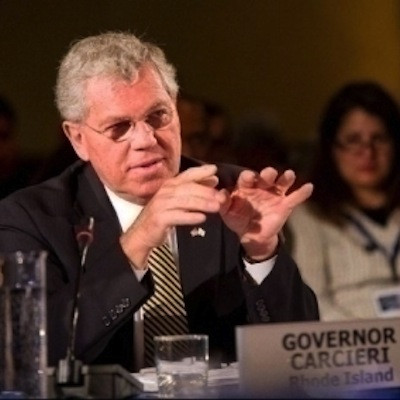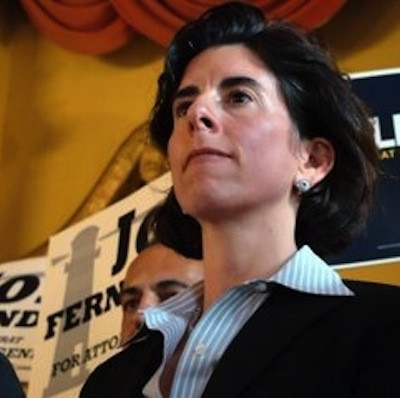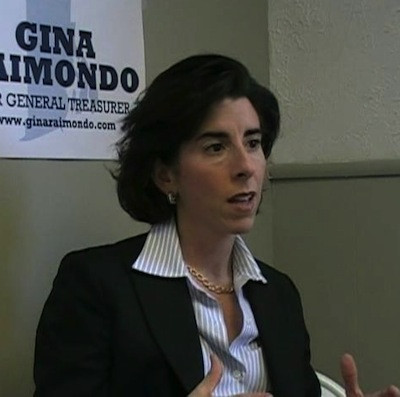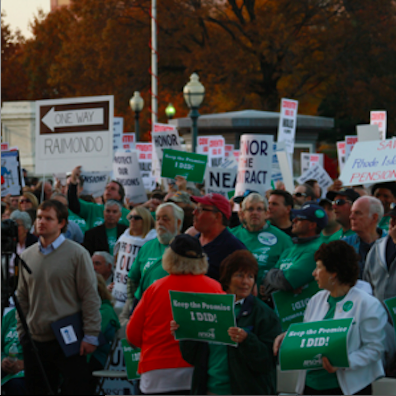Riley: Puerto Rico and Providence on My Mind
Tuesday, April 26, 2016
Much of the country is finally aware of the insolvency in Puerto Rico. The Governor has declared that Puerto Rico cannot pay what it owes. There are differing estimates on the amount owed but bonded debt appears to be $70 + billion and unfunded pension liabilities $35 to $50 billion.
Congress has been wrestling with the fact that currently Puerto Rico does not have the ability to file bankruptcy and reorganize under bankruptcy code. Some worry the United State taxpayers could end up on the hook and almost certainly will take a loss. Other Americans losing would be Puerto Rican municipal bond holders who own them through U.S. Municipal Bond Funds.
PR bill headed to House floor Friday
GET THE LATEST BREAKING NEWS HERE -- SIGN UP FOR GOLOCAL FREE DAILY EBLASTThe political wrangling is fierce, but the basic idea is that someone has to pay the debts or maybe the promises made to employees will just be canceled and they are out of luck. The possible losers are the bond holders (including heavy Wall Street interests), the state employees, Puerto Rico taxpayers, 170,000 creditors and vendors who haven’t been paid and maybe U.S. taxpayers.
After weeks of negotiations there appears to be a potential solution that shares the pain. A bill is being drafted. The bill, which would give Puerto Rico certain powers that are normally available only in bankruptcy, is scheduled to be the subject of a hearing before the House Natural Resources Committee then final amendments before being sent for debate on the floor of the house.
Paul Ryan is spearheading the effort to head off a full blown crisis. “Congress has a constitutional and financial responsibility to bring order to the chaos that is unfolding in the U.S. territory — chaos that could soon wreak havoc on the American bond market,” Mr. Ryan said. Without naming names, he said the bill “holds the right people accountable for the crisis.”
Wisconsin Rep proposes a law very different from Rhode Island law
Representative Sean P. Duffy, a Wisconsin Republican who supported earlier efforts to give Puerto Rico direct access to chapter 9 municipal bankruptcy, introduced the bill on Tuesday last week. In particular, it would give the island the power to unilaterally discharge debt and to force creditors to accept settlements for less money than they were seeking.
The bill also contains provisions meant to reassure Puerto Rico residents that Congress does not want to sideline their elected government during the coming debt negotiations. A previous draft of the bill would have created an oversight board with significant power over Puerto Rico’s economic affairs, such as raising taxes if necessary and repealing certain laws.
Rhode Island law does the opposite. It protects the bond holders to the detriment of employees' promises and RI taxpayers. Rhode Island leaders were concerned that if they didn’t protect bondholders a contagion would spread due to Central Falls bankruptcy in 2010. In addition Rhode Island receivership law would strip the city officials of power temporarily as an overseer would take charge. Providence is on the verge of bankruptcy now and is rated one step above junk.
Opponents of the proposed bill are mostly Wall Street related
Opponents of the bill said on last Tuesday that it was essentially chapter 9 bankruptcy by another name. Matthew Kandrach, vice president of the 60 Plus Association, said the bill “draws on nearly every provision of chapter 9 of the U.S. Bankruptcy Code, and gives a federally appointed ‘Oversight Board’ the authority to apply them retroactively.” Large numbers of investors bought Puerto Rico’s bonds while they were still rated investment grade and when the island was officially excluded from taking shelter in bankruptcy.
Did Puerto Rico and bond underwriters mislead investors?
Puerto Rico has major bond payments coming due in just a few weeks, and its government risks running out of cash. If it simply stops making debt payments, it is likely to be sued by one creditor group after another, creating a tangle of lawsuits that could take years to unravel.
In the meantime, Puerto Rico would be a pariah in the bond market, unable to borrow affordably. Because it is not a sovereign nation, it cannot seek help from such lenders of last resort as the International Monetary Fund. But lawmakers have also been worried about setting a dangerous precedent by giving Puerto Rico extraordinary tools to wipe out debt, fearing it would not be long before troubled states like Illinois came to Washington seeking the same thing.
So how would a Providence receivership happen?
First, Providence would need to be declared insolvent or “in crisis," but what is a “local government fiscal crisis?" The following is a direct quote from Mercatus Center author Eric Scorsone Ph.D. in his paper entitled "Municipal Fiscal Emergency Laws: Background and Guide to State-Based Approaches."
“In one sense, a local government fiscal crisis is simply a lack of cash to pay ongoing commitments. These commitments may include vendor payments, pension payments, payroll, bond payments, and other such items. Governments typically hold both cash and investment vehicles for financial assets. When cash and short-term investments on hand are less than immediate cash commitments, there is situation of cash insolvency, or a local fiscal emergency.”
Providence has been in crisis a long time. Somewhere along the way, Providence was insolvent and city officials deferred payments to the pension plan probably decades ago, and they kept doing it year after year. They never paid it back or even on time. Yet they counted the missing money in the Pension plan as an asset. The money is gone. It was spent on other things and a full regulatory analysis will either reveal that Providence has either mislead everyone (my claim) or alternatively that every city and town in America can increase their cash flow by using Providence and Enron style of accounting.
Most likely Providence will be in receivership, but unlike Puerto Rico who will properly impair bondholders as well as haircut employee benefits and tax Puerto Ricans more, Providence employees and taxpayers and bondholders will all share less of the burden than will RI State taxpayers in all 38 other communities. People in Tiverton or Cumberland will be paying for the retirements of firemen in Providence. Does that sound fair? Ask Gina Raimondo if she would bail out either Puerto Rico or Providence.
Michael G. Riley is vice chair at Rhode Island Center for Freedom and Prosperity, and is managing member and founder of Coastal Management Group, LLC. Riley has 35 years of experience in the financial industry, having managed divisions of PaineWebber, LETCO, and TD Securities (TD Bank). He has been quoted in Barron’s, Wall Street Transcript, NY Post, and various other print media and also appeared on NBC News, Yahoo TV, and CNBC.
Main photo: Old San Juan, Puerto Rico. Flickr/cogito ergo imago
Related Slideshow: Timeline - Rhode Island Pension Reform
GoLocalProv breaks down the sequence of events that have played out during Rhode Island's State Employee Pension Fund reform.
Related Articles
- Riley: Spin Doctor Seth at it Again
- Riley: Junk Bond Collapse Hits RI Pension Fund
- Michael Riley: 15 Who Made a Difference in 2015
- Riley: RI Pensions Returns Raimondo Style 2011-2015
- Riley: Puerto Rico Hedge Fund “Bailout” to Follow Rhode Island Law
- Riley: Why Does Hoyle Allow Providence to Cheat Retirees and Other Cities Can’t?
- Riley: Warren Buffett, Jorge Elorza and Jack Bogle
- Riley: Kushner and the “Hot Air Ball”
- Riley: MacBeth Has the Scent and Should Not Back Down
- Riley: GASB 68 is Here and Reports are Due
- RILEY: EXTREME Market Stress This Week
- Riley: Governor Raimondo Aware of Providence Lies
- Riley: A Lively Thought Experiment
- Riley: The Odds That RI Pension Plan will be Fully Funded by 2040
- Riley: Mr. Achorn Do You Still Want Door Number 1?
- Riley: Dear SEC, Say Hello to Mayor Elorza & Governor Raimondo
- Riley: Wainwright Issues Cash Flow Report That Points to Providence Asset Fraud
- Riley: RI Treasurer & Hedge Fund Debacle – Worst Returns in a Decade
- Riley: Top 10 Signs Providence is Bankrupt
- Riley: Providence and Rhode Island Pension Funds Hemorrhaging Money
- Riley: Troubling Facts in Providence Pension Plan
- Riley: Puerto Rican Debt? Treasurer Magaziner Must Fire Cliffwater
- Riley: Why Does NY Have Funded and Honest Pension Plans?
- Riley: Default, Theft, and Renewed Call for SEC Providence Pension Investigation
- Michael Riley: Failed Pension Commission Ponders Permanent Oversight Commission
- Michael Riley: Don’t Pay
- Michael Riley: West Warwick and Gallogly Pull Hoax on Taxpayers
- Michael Riley: 38 Studios Insider Trade and Municipal Fraud
- Michael Riley: GASB 68 Portends Huge Problems for City and State
- Michael Riley: Municipal Pension Commission Comes Unglued
- Michael Riley: State Pension Fix in Limbo as Municipal Debt Grows
- Michael Riley: Moody’s Lowers the Bomb…Look Out Rhode Island
- Michael Riley: Taveras and Polisena No-Shows at Pension Commission
- Michael Riley: RI Municipal Pension Study Comm. Is in Failure Mode
- Michael Riley: Rhode Island’s Potential Pension Nightmare
- Michael Riley: From Head-start to Harvard to the Hoosegow?
- Michael Riley: From Head-start to Harvard to the Hoosegow Part 2
- Michael Riley: Projo, Elorza and Cianci are all Blind to Reality
- Michael Riley: Alerting Treasurers, Governors: Providence Pension Fund Collapsing
- Michael Riley: A Personal Plea
- Michael Riley: Rhode Island Leaders Only Need to Focus on Two Things
- Michael Riley: Trust Chafee? I Don’t Think So
- Michael Riley: The Reality of Providence Pension Liability
- Michael Riley: Integrity? Whatever…
- Michael Riley: Pension Obligation Bonds? Oh My!!
- Michael Riley: The RI Treasurer Democratic Primary Race Gets Uglier
- Michael Riley: Rhode Island Treasurer is About Integrity and Experience
- Michael Riley: Can Taveras Clean Up His Act for the New Mayor?









































